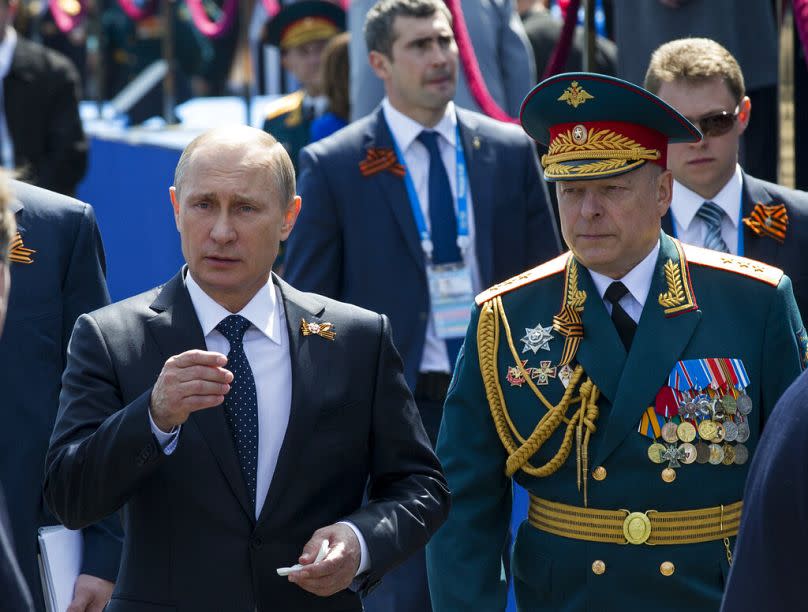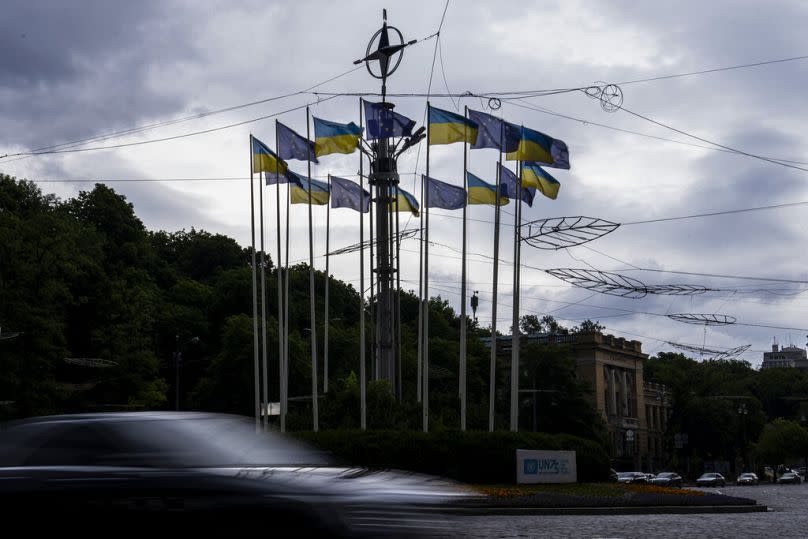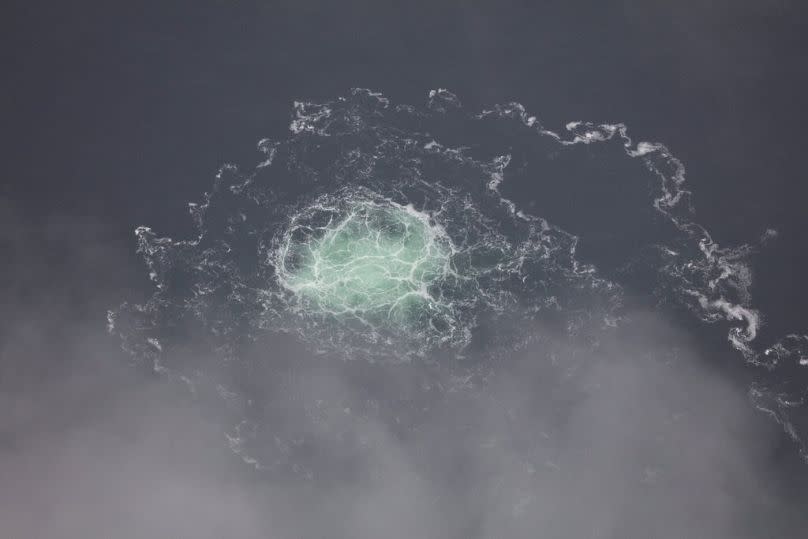Ukraine war: Soledar 'still standing', Russia mulls draft expansion, Sweden has 'something to hide'

1. Soledar still standing, Ukrainian military claims
Ukraine said on Thursday its troops were holding out despite heavy fighting on a battlefield littered with bodies around a salt mining town in eastern Ukraine, where Russian mercenaries have claimed Moscow's first significant gain in half a year.
The ultra-nationalist contract militia Wagner, run by an ally of President Vladimir Putin outside the main chain of military command, claims to have taken Soledar after intense fighting that it said had left the town strewn with Ukrainian dead. But Moscow has held off officially proclaiming victory.
"At the moment, there are still some small pockets of resistance in Soledar," Andrei Bayevsky, a Russian-installed local politician, said in an online broadcast.
Ukraine has acknowledged Russian advances, but Deputy Defence Minister Hanna Malyar said fighting was still fierce.
The Russians were "moving over their own corpses", she said.
Serhiy Cherevatyi, the spokesperson for Ukraine's eastern military command, told Ukrainian TV there was constant shelling in Soledar. "The enemy is trying to take the initiative and attack. But they are failing to break through our defences."
A 24-year-old Ukrainian soldier, positioned outside the small town, said: "The situation is difficult but stable. We're holding back the enemy ... we're fighting back."
With fighting on Ukraine's eastern front as attritional as ever, Kremlin watchers were poring over Russia's latest switch of battlefield leadership a day after Valery Gerasimov, chief of the military's general staff, was unexpectedly given direct command of the invasion.
The previous commander of three months' standing, Army General Sergei Surovikin, was effectively demoted to become one of Gerasimov's three deputies.
Moscow explained the decision -- at least the third abrupt change of top commander in the 11-month conflict -- as a response to the campaign's growing importance.
Russian and Western commentators alike saw attempts to shift blame for setbacks in which Russia has lost around 40% of the territory it had seized since February.
Battle for Soledar: 'First Russia sends Wagner mercenaries, then highly trained paratroopers'
Russian capture of Soledar could pave the way for Bakhmut invasion

2. Russia mulls expanding upper draft age limit from 27 to 30, Moscow lawmaker says
Russia could raise the upper age limit for citizens to be conscripted into the armed forces as soon as this spring, a senior lawmaker has said, as part of Moscow's plans to boost the number of Russian troops by 30%.
President Vladimir Putin gave his backing in December to defence ministry proposals to raise the age range for mandatory military service to cover Russian citizens aged 21-30, rather than the current range of 18-27.
The chairman of the Russian parliament's defence committee, Andrei Kartapolov, said in an interview with the official parliamentary newspaper that Russia could raise the upper age limit for conscription to 30 for this year's spring draft.
But only after a one-to-three-year "transition period" would the lower limit be raised from 18 to 21 years, Kartapolov said.
Critics said the idea of a transition period was a transparent attempt by Russian authorities to increase the number of Russians eligible to be called up for military service to plug massive manpower shortages resulting from heavy losses in the war in Ukraine.
Russia's armed forces are a mix of contracted soldiers and conscripts. Shoigu has outlined plans to increase the total number of combat personnel to 1.5 million from 1.15 million.
Asked about the possible changes, Kremlin spokesman Dmitry Peskov said on Thursday that President Vladimir Putin "conceptually supported" raising the conscription age, but the exact details were up to the defence ministry to work out.
The role of conscripts in Ukraine came under intense focus soon after Russia's invasion last February, with the defence ministry acknowledging some had been sent to fight there despite statements from Putin that this would not happen.
In September, Russia announced its first mobilisation since World War II, calling up more than 300,000 former soldiers -- including ex-conscripts -- in an emergency draft to support the war in Ukraine.
Western governments say Russia has lost tens of thousands of soldiers in nearly 11 months of fighting.
Ukraine war: New Russian mobilisation, hypersonic weapons and killer drones
Ukraine war: Russia's mobilisation efforts are likely to fail, according to ISW think tank

3. Russia's new deputy military commander visits troops in Belarus
A delegation headed by the commander of Russia's ground forces, Oleg Salyukov, visited Belarus on Thursday to inspect the combat readiness of a joint force stationed there, the Belarusian defence ministry said.
The visit took place a day after Salyukov was named as one of the deputy commanders of Russia's military operation in Ukraine in the latest of a series of reshuffles.
Moscow and its close ally Minsk have beefed up their joint military grouping in Belarus and plan to hold joint aviation drills there from next Monday.
The exercises form part of a pattern of activity that has prompted Ukraine to warn that Russian President Vladimir Putin may try to use Belarus to launch a new ground invasion of Ukraine from the north.
Belarusian leader Alexander Lukashenko allowed Putin to use his country as one of the launchpads to invade Ukraine last February, when Russian forces were beaten back in an attempt to take the capital Kyiv.
Military analysts say Russia has also used Belarusian facilities to train up newly mobilised soldiers who were called up last September to boost its forces in Ukraine.
However, Belarus has not sent its own troops into Ukraine in support of Russia's war there.
Belarus detains anti-Lukashenko former presidential candidate
Belarus claims it shot down a Ukrainian missile which entered its airspace

4. Kyiv presses on with judiciary reform despite long road to EU membership
A congress of Ukrainian judges on Thursday appointed the last of eight new members to an important judicial oversight body, a move experts and officials have said is critical to Kyiv's push to reform its judiciary.
The European Union made cleaning up the courts one of its main recommendations when it offered Ukraine the status of candidate member last June, four months after Russia's invasion.
The selection of the new members to the High Council of Justice (HCJ) means the body can resume its work overseeing the appointment, dismissal and disciplining of judges.
"Looking forward to the reformed HCJ showcasing rule of law and integrity in practice," the EU's ambassador to Ukraine, Matti Maasikas, wrote on Twitter.
Ukraine's parliament had already passed all the legislation sought by the EU before the start of accession talks with Kyiv, the speaker of the assembly said last month.
But implementing those laws and achieving membership is widely expected to be a long road.
Some watchdogs have also warned that powerful interests are prepared to push back against reforms, especially in the judiciary.
In a statement on Thursday, the DEJURE Foundation, a non-governmental organisation which tracks judicial reform, expressed concern over the quality of the eight new selections.
"(Judges) demonstrated their unpreparedness for true agents of change in the judicial system," it said. "We will evaluate the new team by their decisions, the new HCJ has a chance to dispel the doubts of society".
Anti-corruption authorities in Kyiv have also doubled down in recent months on their battle against graft.
EU candidates must 'convince' members they are prepared, enlargement commissioner tells Euronews
Approved! EU countries endorse Ukraine and Moldova as official candidates to join bloc

5. Russia accuses Sweden of having 'something to hide' in Nord Stream blasts inquest
Russia questioned on Thursday whether Sweden had "something to hide" over explosions that damaged the Nord Stream gas pipelines last year, as it slammed Stockholm for not sharing information in the ongoing investigations into the blasts.
Swedish and Danish authorities are investigating four holes in the Nord Stream 1 and 2 pipelines which link Russia and Germany via the Baltic Sea and have become a flashpoint in the Ukraine crisis.
Foreign Ministry spokeswoman Maria Zakharova said Sweden's refusal to engage with Russian prosecutors was "confusing" and said Moscow had a right to know the details of the probe into the explosions, which occurred last September.
Moscow proposed to Stockholm the establishment of a joint investigation into the blasts, which could see three of the four lines of the Nord Stream 1 and 2 gas projects put permanently out of use. But both Sweden and Denmark have rejected the idea of Russian participation.
At a briefing in Moscow on Thursday, Zakharova suggested there were reasons for that decision.
"Maybe Russian investigators, conducting an objective investigation, could come to an inconvenient conclusion... about who conducted this act of sabotage, terrorism. About who thought it up, and who carried it out," she told reporters.
Zakharova said Sweden was "concealing" facts about what it had discovered in the investigation, suggesting that "the Swedish authorities have something to hide".
Sweden and other European investigators say the attacks were carried out on purpose, but they have not said who they think was responsible. Moscow, without providing evidence, has blamed the explosions on Western sabotage.
Construction of Nord Stream 2, designed to carry Russian gas to Germany, was completed in September 2021, but was never put into operation after Berlin shelved certification just days before Moscow sent its troops into Ukraine in February.

 Yahoo News
Yahoo News 
